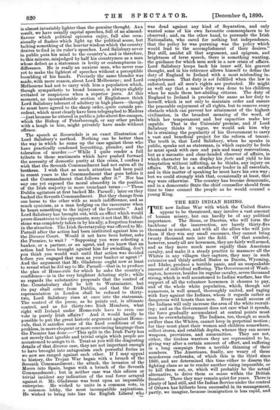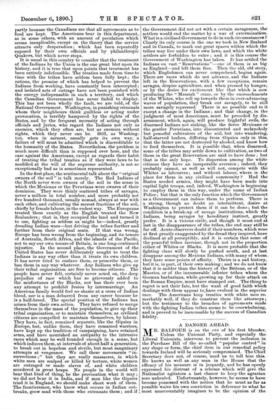THE RED INDIAN RISING. T HE new Indian War with which
the United States appear to be threatened, may involve a vast amount of human misery, but can hardly be of any political importance. The Sioux, or Dacotas, who will form the backbone of the insurrection, are barely thirty-five thousand in number, and with all the allies who will join them if they win any small successes, they cannot bring twenty thousand men into the field. Of that number, however, nearly all are horsemen, they are fairly well armed, and as they move much more rapidly than American cavalry, and make it a steady practice to massacre all the Whites in any villages they capture, they may in such extensive and thinly settled States as Dacota, Wyoming, and Idaho, produce a terrible panic, and an unspeakable amount of individual suffering. The Government of Wash- ington, however, besides its regular cavalry, seven thousand strong, which is well accustomed to Indian warfare, has the support of all the volunteer horsemen it chooses to pay, and of the whole white population, which, though not numerous, is well armed, thoroughly united, and raging with fury against the Indians, whom it regards rather as dangerous wild beasts than men. Every small success of the Indians will only increase the area of the white recruit- ing; and as the Government does not care what it spends, the force gradually accumulated at central points must soon be overwhelming. The Indians, too, though so much swifter than the Whites, cannot keep in perpetual motion ; for they must plant their women and children somewhere, collect stores, and establish depots, whence they can secure weapons, provisions, and ammunition. They are not, either, the tireless warriors they are represented to be, giving way after a certain amount of effort, and suffering in a long campaign from a terrible thinning of their numbers. The Americans, finally, are weary of these murderous outbreaks, of which this is the third since 1860, and are determined this time either to disarm the fighting clans so as to render another rising impossible, or to kill them out, or, which will probably be the actual alternative, to drive them en masse within the British frontier. There they may remain quiet for years. There is plenty of land still, and the Indian Service under the control of Ottawa has hitherto been successful in its management, partly, we imagine, because immigration is less rapid, and partly because the Canadians see that all agreements as to food are kept. The Americans bear in this department, as in some others, with an amount of peculation which seems inexplicable, except on the theory that the service attracts only desperadoes ; which has been repeatedly exposed by their own officials and by philanthropic Quakers, but which never stops.
It is usual in this country to consider that the treatment of the Indians by the Union is the one great blot upon its history, and it is true that upon points that treatment has been entirely indefensible. The treaties made from time to time with the tribes have seldom been fully kept ; the rations, the promise of which has helped to prevent the Indians from working, have constantly been intercepted ; and isolated acts of outrage have not been punished with the energy indispensable in such a territory, and which the Canadian Government has never failed to display. This has not been wholly the fault, we are told, of the National Government. Washington, in punishing criminals whom their neighbours think guiltless or acting under provocation, is terribly hampered by the rights of the States, and by the frequent necessity of acting through officials and juries, who regard the Indians not only as enemies, which they often are, but as enemies without rights, which they never can be. Still, as Washing- ton, when in earnest, usually gets its own way, a failure of will must be admitted which is discreditable to the humanity of the States. Nevertheless, the problem is much more difficult than is supposed over here, and the case against the Americans, except as regards their habit of treating the tribal treaties as if they were laws to be modified at the will of the supreme authority, is not so exceptionally bad as is sometimes represented.
In the first place, the sentimental talk about the " original owners of the soil " is talk merely. The Red Indians of the North never were owners of the soil in the sense in which the Mexicans or the Peruvians were owners of their dominion. They were thinly scattered tribes of savages, never a million in total number, and more probably not five hundred thousand, usually nomad, always at war with each other, and cultivating the merest fractions of the soil, chiefly by female labour, in the rudest way. The Europeans treated them exactly as the English treated the New Zealanders ; that is, they occupied the land and turned it to use, fighting as seldom as might be—indeed, greatly dreading Indian wars—but driving the tribes further and further from their original seats. If that was wrong, Europe has been wrong from the beginning, and its tenure of Australia, South Africa, and the islands of the Pacific, not to say our own tenure of Britain, is one long-continued injustice. In the second place, the Government of the United States has never deliberately sought to treat the Indians in any way other than it treats its own children. It has never tried to enslave them, or proscribe them, or ban them in any way whatever. Any Indians who give up their tribal organisation are free to become citizens. The people have never felt, certainly never acted on, the deep prejudice of race which has so grievously added to the misfortunes of the Blacks, nor has there ever been any attempt to prohibit fusion by intermarriage. An American family would feel no shame at a cross of Indian blood, nor is a man debarred from any career because he is a half-breed. The special position of the Indians has arisen from their own action. They have refused to merge themselves in the mass of the population, to give up their tribal organisation, or to maintain themselves, as civilised citizens are compelled to maintain themselves, by labour. They have, in fact, remained separate, like the Gipsies in Europe, but, unlike them, they have remained warriors, have kept up the tradition of campaigning, have retained arms, and have nourished an antipathy to the intrusive races which may be well founded enough in a sense, but which induces them, at intervals of about half a generation, to break out in hopeless and sterile, but most sanguinary attempts at vengeance. We call these movements " in- surrections ;" but they are really massacres, in which white men are scalped or killed by torture, white women are outraged or made slaves of, and white children murdered in great heaps. No people in the world will bear that kind of thing, be the provocation what it may ; we did not bear it in India, and if men like the Gipsies tried it in England, we should make short work of them. The frontiersmen, who know what occurs in Indian out- breaks, grow mad with those who extenuate them ; and if the Government did not act with a certain savageness, the settlers would end the matter by a war of exterminatiOn: What is a civilised Government to do in such circumstances ? Clearly its only course is the one we took in New Zealand and in Canada, to mark out great spaces within which the tribes may live under their own laws, and which the white settlers are forbidden to enter ; and it is this course the Government of Washington has taken. It has settled the Indians on vast " Reservations "—one of them is as big as England—and left them free. Then the old, old story, which Englishmen can never comprehend, begins again. There are races which do not advance, and the Indians left in the Reservations, with a few exceptions, remain savages, despise agriculture, and when pressed by hunger, or by the desire for excitement like that which is now producing the " Messiah " craze, or by the encroachments of the Whites, who roll up towards them in ever-advancing waves of population, they break out savagely, to be still more savagely repressed. There is no possible end to it except a change in the Indians ; and that change, in the judgment of most Americans, must be preceded by dis- armament, which, again, will produce frightful evils, the disarmed Indians not sinking, like the fierce Mexicans or the gentler Peruvians, into discontented and melancholy but peaceful cultivators of the soil, but into wandering, half-starved loafers, differing from Gipsies only in this, that the latter are not destroyed by alcohol, and know how to feed themselves. It is possible that, when disarmed, some of the tribes may settle down to cultivation, as two of those in the great Reservation are said to have done ; but that is the only hope. To dispersion among the white citizens they have an insuperable aversion ; indeed, they probably cannot, as well as will not, compete with the Whites as labourers ; and without labour, where is the place for them in any civilised community? Had the States needed armies, they might have been made into capital light troops, and, indeed, Washington is beginning to employ them in this way, under the name of Indian Police ; but that is the only function which the Government as a Government can induce them to perform. There is a strong, though no doubt an intermittent, desire at Washington to protect them if it can be done ; but the condition is a break-up of savage institutions, which the Indians, being savages by hereditary instinct, greatly prefer. It is a vicious circle, and though it must end at last in the disappearance of the tribes, the end may still be far off. Acute observers doubt if their numbers, which were at first greatly exaggerated by the dread they inspired, have declined at all perceptibly, and it is certain that some of the peaceful tribes increase, though not in the proportion either of Whites or Blacks. It is more probable that the fighting clans will slowly be pushed south, and at last disappear among the Mexican Indians, with many of whom, they have some points of affinity. Theirs is a sad history, but it is, in part, of their own making ; and we do not know that it is sadder than the history of the Britons, or of the Maories, or of the innumerable inferior tribes whom the German barbarians, while growing up for their attack on the Roman Empire, must have stamped out. The thing to regret is not their fate, but the want of good faith which dealings with them appear to.have evolved in the superior race. The Americans keep treaties with white men re- markably well, if they do construe them like attorneys ; but the testimony to the breaches of agreements made with the fighting Indian tribes seems to be overwhelming, and is proved to be inexcusable by the success of Canadian fidelity.























































 Previous page
Previous page